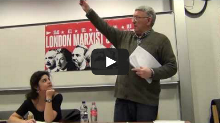
Gaeilge | Galego | Ελληνικό | בעברית | Italiano | 日本語 | 한국어 | Македонски | Magyar | Nederlands
Norsk | Polski | Português | Русский | Română | slovenščina | srpskohrvatski | Svenska | Türkçe | اُردو | Tiếng Việt
China
The Chinese Communist Party 1937-49 – The Unfolding of Historical Necessity: China’s Great Revolution – Part Ten
 To most people’s ears, the name ‘People’s Republic of China’ is invested with intransigent Marxist dogma, to the extent that right wing journalists and politicians mockingly referred to councils run by the British far left as being ‘The People’s Republic of ...’. But far from motivations of the Marxist ‘dogma’ of irreconcilable class struggle, this name was carefully chosen by the CCP as an anti-Marxist blurring of class distinctions. It is the consummate expression of the CCP’s bonapartist methods of coming to power, that is to say, its establishment of power through the balancing and playing off of the various classes in society.
To most people’s ears, the name ‘People’s Republic of China’ is invested with intransigent Marxist dogma, to the extent that right wing journalists and politicians mockingly referred to councils run by the British far left as being ‘The People’s Republic of ...’. But far from motivations of the Marxist ‘dogma’ of irreconcilable class struggle, this name was carefully chosen by the CCP as an anti-Marxist blurring of class distinctions. It is the consummate expression of the CCP’s bonapartist methods of coming to power, that is to say, its establishment of power through the balancing and playing off of the various classes in society.
The Chinese Communist Party 1937-49 – The Unfolding of Historical Necessity: China’s Great Revolution – Part Nine
 By now it should be clear that the all rounded disintegration of Chinese bourgeois society, which from the moment of its birth was a weakling kept alive by stronger, foreign parents, is the only real explanation for the CCP’s stunning military victory in 1949.
By now it should be clear that the all rounded disintegration of Chinese bourgeois society, which from the moment of its birth was a weakling kept alive by stronger, foreign parents, is the only real explanation for the CCP’s stunning military victory in 1949.
China: Mass mining workers’ demonstration in Heilongjiang coal mine town
 Tens of thousands of mining workers in Shuangyashan city in the Heilongjiang province in China have clashed with the police after four days of demonstrations, demanding the state-owned mining company to distribute wages owed to workers.
Tens of thousands of mining workers in Shuangyashan city in the Heilongjiang province in China have clashed with the police after four days of demonstrations, demanding the state-owned mining company to distribute wages owed to workers.
The Chinese Communist Party 1937-49 – The Unfolding of Historical Necessity: China’s Great Revolution – Part Eight
 With total armed forces of 2.5m men compared to the CCP’s 1m in the aftermath of WWII, all bourgeois commentators and strategists now saw the Guomindang’s new war - against the CCP - as a formality. The government’s advantage was estimated at “almost three-to-one in fighting men and at least five-to-one in arms”, along with a complete monopoly of air and sea power (Harrison, China’s Long March to Power, p367). Not only that, but the CCP lacked any significant foreign backer, for the USSR, as explained above, treacherously continued to back the Guomindang even after Japan’s defeat.
With total armed forces of 2.5m men compared to the CCP’s 1m in the aftermath of WWII, all bourgeois commentators and strategists now saw the Guomindang’s new war - against the CCP - as a formality. The government’s advantage was estimated at “almost three-to-one in fighting men and at least five-to-one in arms”, along with a complete monopoly of air and sea power (Harrison, China’s Long March to Power, p367). Not only that, but the CCP lacked any significant foreign backer, for the USSR, as explained above, treacherously continued to back the Guomindang even after Japan’s defeat.
The Chinese Communist Party 1937-49 – The Unfolding of Historical Necessity: China’s Great Revolution – Part Seven
 Japan’s ‘prompt and utter destruction’ not in China but from nuclear blasts at home produced a surreal situation within China. In the chaos and desperation of WWII the capitalist states fought one another with such ferocity that capitalism itself was under threat. In Europe the Nazis’ actions produced an alliance of US and British imperialism with the Soviet Union, ultimately leading to the destruction of capitalism in Eastern and even parts of Central Europe.
Japan’s ‘prompt and utter destruction’ not in China but from nuclear blasts at home produced a surreal situation within China. In the chaos and desperation of WWII the capitalist states fought one another with such ferocity that capitalism itself was under threat. In Europe the Nazis’ actions produced an alliance of US and British imperialism with the Soviet Union, ultimately leading to the destruction of capitalism in Eastern and even parts of Central Europe.
The Chinese Communist Party 1937-49 – The Unfolding of Historical Necessity: China’s Great Revolution – Part Six
 If, by 1937, the war of national liberation against Japan was the immediate goal and cause of the mass movement of Chinese workers and peasants around the CCP, then the agrarian revolution was its true, final cause.
If, by 1937, the war of national liberation against Japan was the immediate goal and cause of the mass movement of Chinese workers and peasants around the CCP, then the agrarian revolution was its true, final cause.
The Chinese Communist Party 1937-49 – The Unfolding of Historical Necessity: China’s Great Revolution – Part Five
 From the time of its birth in the early 1920s, the Chinese Communist Party, conceived by the revolutionary upheaval of Chinese society and the Russian led Communist International, could hardly have wished for a worse ‘upbringing’. Moscow’s leadership is analogous to that of a negligent and abusive parent whose selfishness scars the child for the rest of its life. As we shall now see, this absence of leadership continued right up to and even after the taking of power in 1949 and was one of several factors undermining, delaying and distorting the character of the revolution in 1949.
From the time of its birth in the early 1920s, the Chinese Communist Party, conceived by the revolutionary upheaval of Chinese society and the Russian led Communist International, could hardly have wished for a worse ‘upbringing’. Moscow’s leadership is analogous to that of a negligent and abusive parent whose selfishness scars the child for the rest of its life. As we shall now see, this absence of leadership continued right up to and even after the taking of power in 1949 and was one of several factors undermining, delaying and distorting the character of the revolution in 1949.
More Articles...
- The Chinese Communist Party 1937-49 – The Unfolding of Historical Necessity: China’s Great Revolution – Part Four
- The Chinese Communist Party 1937-49 – The Unfolding of Historical Necessity: China’s Great Revolution – Part Three: The CCP at war
- The Chinese Communist Party 1937-49 – The Unfolding of Historical Necessity: China’s Great Revolution – Part Two: The Sino-Japanese War
- China and the World Economy in 2016: "Sell Everything"
- The Chinese Communist Party 1937-49 – The Unfolding of Historical Necessity: China’s Great Revolution – Part One
Page 1 of 16
Related articles
More categories
The Pan-American School
Donate to help bring comrades to the Pan-American school.
[Read the appeal]












